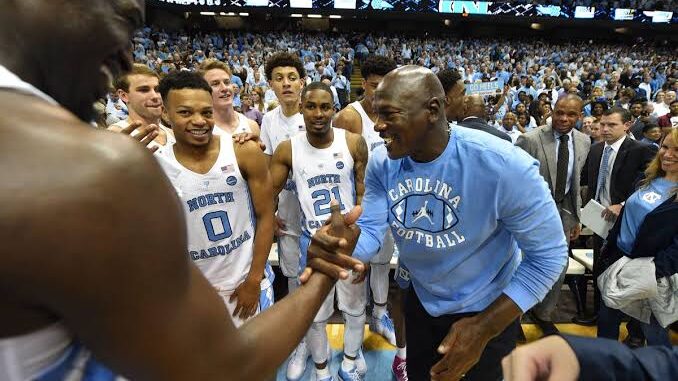
Chapel Hill, North Carolina The Dean E. Smith Center’s sacred corridors reverberate with the echoes of brilliance as well as the thunderous cheers of the crowd. With unmatched skill and inspirational leadership at its core, the North Carolina Tar Heels men’s basketball program is more than just a team—it’s a dynasty. The history of basketball at UNC is a rich tapestry, constantly interwoven with strands of success, creativity, and an unshakeable dedication to greatness, from the court-commanding presence of its legendary players to the strategic genius of its coaching legends..
For more than a century, the Tar Heels have enthralled supporters with their unique combination of athleticism, skill, and a mutual love of the “Carolina Way.” This timeless ideology, which prioritises selfless play, academic accomplishment, and community involvement, has been supported by a succession of coaches who recognised that real success went well beyond the scoreboard.
Dean Smith, a legendary coach whose impact went beyond the game itself, is at the centre of this legacy. Smith guided the Tar Heels to an incredible 11 Final Four appearances, 879 victories, and two NCAA national titles (1982 and 1993) between 1961 and 1997. Beyond the impressive stats, Smith was a trailblazer, renowned for his tactical inventions like as the “Four Corners” offence and his steadfast dedication to the intellectual and personal growth of his players. In 1966, he signed Charlie Scott, the ACC’s first black scholarship athlete, showcasing his forward-thinking outlook and dedication to social change. His “coaching tree” is extensive, since Roy Williams and many of his other protégés have successfully pursued coaching careers by applying his teachings.
Williams, a former assistant under Smith, continued the tradition of excellence upon his return to Chapel Hill in 2003. Over 18 seasons, he added three more national championships (2005, 2009, 2017) to the Tar Heels’ illustrious trophy cabinet, solidifying his place as another coaching icon. Williams embodied the spirit of the “Carolina Way,” fostering a family atmosphere while consistently fielding competitive, championship-contending teams.
Before Smith, Frank McGuire laid crucial groundwork, notably leading the 1957 “Iron Five” to an undefeated season and the program’s first NCAA title. His fiery demeanor and recruiting prowess set a new standard for the nascent ACC.
Yet, even the most brilliant coaching minds require extraordinary talent to execute their visions. The Tar Heels’ roster has been a veritable constellation of basketball stars. The name Michael Jordan is synonymous with basketball greatness, and his time at UNC (1981-1984) served as the launching pad for his legendary career. His iconic game-winning shot in the 1982 NCAA Championship against Georgetown remains etched in college basketball lore, a testament to his clutch ability and burgeoning superstar status. Jordan, along with teammates like James Worthy and Sam Perkins, formed the core of that championship squad, showcasing the immense talent that consistently flocked to Chapel Hill.
Decades earlier, players like Lennie Rosenbluth, the driving force behind the 1957 undefeated team, set the early benchmarks for offensive prowess, leading the team in scoring during their championship run. Billy Cunningham, known as “The Kangaroo Kid,” redefined the forward position in the 1960s with his athleticism and all-around game, becoming Dean Smith’s first true star.
The lineage continued with dazzling guards like Phil Ford in the 1970s, a true floor general and National Player of the Year, whose retired jersey hangs proudly in the rafters. In the 1990s, the dynamic duo of Antawn Jamison and Vince Carter captivated audiences with their explosive play, leading the Tar Heels to consecutive Final Fours. Carter, a prodigious dunker, left an indelible mark with his gravity-defying athleticism, setting a new standard for aerial artistry in Chapel Hill.
As evidence of his unwavering work ethic and determination to succeed, Tyler Hansbrough, who dominated the paint in the late 2000s, became the ACC’s all-time top scorer and guided the Tar Heels to the 2009 national championship. Players like RJ Davis and Armando Bacot are still making their mark in the record books today, continuing the tradition of Tar Heel greatness.
These iconic athletes and forward-thinking leaders have had an incalculable combined influence. They have developed a winning culture, honesty, and a strong bond with the university and its ardent fan base in addition to winning games and titles. Every generation adds new chapters to the UNC basketball program’s enduring dedication to the sport and the eternal principles that make up the “Carolina Way.” The history of the North Carolina Tar Heels is changing as new players join the team and new leaders take over, ensuring that future generations will have many more memorable experiences.
Leave a Reply